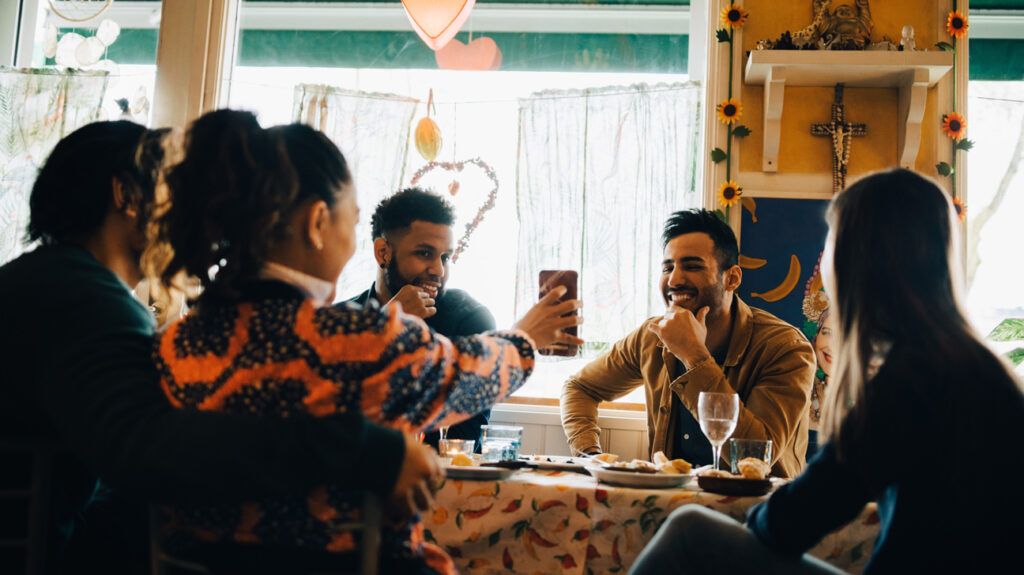
- New research shows that people enjoy deep conversations with strangers but are more likely to engage in small talk.
- Findings show that people often resist meaningful conversations with strangers because they think others are not interested in learning about them.
- Possible factors include overestimation of awkwardness and a fear of vulnerability.
Humans are social creatures who thrive on meaningful connections, but most people stick to small talk when conversing with strangers. If deeper conversations can increase well-being, why don’t we do it in all of our interactions?
New research from the American Psychological Association (APA), published in September 2021 in the Journal of Personality and Social Psychology, aimed to find out by studying the human propensity for small talk.
The results show that people often overestimate awkwardness and underestimate the amount of joy that can come from meaningful discussions with strangers.
Researchers conducted 12 experiments with over 1,800 subjects that involved either small talk or deep conversation with a partner.
The small talk discussions included topics such as a favorite TV show or the weather. In contrast, deeper conversations involved sharing intimate details, such as the last time they cried in front of someone, requiring some element of vulnerability.
Subjects were also asked to estimate how awkward or enjoyable they thought their discussions would be and how connected they’d feel to their partner afterward. Following the discussions, subjects were asked to evaluate what transpired.
Results showed that most subjects overestimated how awkward they’d feel engaging in both small talk and deep discussion. Greater feelings of connection were experienced overall, with the positive effects most pronounced in deep conversations, which were also the most enjoyable.
The findings suggest that positive experiences associated with deep conversations are likely to increase short-term well-being, with a potential for stronger social connections to promote well-being in the long term.
“The quality of our social relationships is one of the biggest determinants of well-being,” Nicholas Epley, PhD, a professor of behavioral science at the University of Chicago Booth School of Business, said in an interview with Psych Central.
“Having meaningful conversation that strengthens social bonds should also strengthen our relationships.”
Compared to small talk, deep conversations require sharing personal information, which can be a vulnerable experience. According to research, people are also more likely to assume that strangers aren’t interested in learning about them on a personal level.
Gillian Sandstrom, PhD, a senior lecturer in the Department of Psychology at the University of Essex, said that a fear of vulnerability could be explained by our need to feel a sense of belonging.
“Risking negative judgments from others is scary,” Sandstrom said by email. “When we talk to a stranger, we’re trying to find points of connection — we don’t know where to start, so we comment on the weather or ask about their day.”
Sandstrom explained that multiple fears factor into our reservations about sharing intimate aspects of ourselves with strangers. We might worry what the other person might think, whether they’ll become bored, or if we have the social skills to keep the conversation going.
Once we’re able to move past any fears of vulnerability and start sharing personal details about ourselves, sharing is usually reciprocated by the other person, Sandstrom said.
Surveys conducted by Epley’s research team before and during the pandemic showed that respondents wished their conversations were deeper than what they were currently having, suggesting a general desire for more meaningful conversations with others overall.
“We find that people may hold themselves back from having the conversations they’d prefer because they misunderstand how interested others also are in having deeper conversations,” Epley said. “I don’t think this has changed a lot during the pandemic, although we don’t know for sure.”
By contrast, Sandstrom said she’s recently been enjoying small talk now that social distancing measures have lifted.
“Earlier in the pandemic, you couldn’t really ask someone what they did on the weekend because nobody was doing anything,” she said. “But in general, people want to connect, want to know and be known, and we don’t get there when we only have small talk.”
If you’re willing to move past any awkwardness, here are a few tips to allow yourself to be vulnerable and engage in meaningful conversations with strangers.
Be curious and ask questions
Research from 2017 reported that asking questions increases likability and shows the other person that you’re genuinely interested. Not to mention, many people generally enjoy talking about themselves.
Embrace the power of reciprocal self-disclosure
If you share something with a stranger, they’ll be more likely to share something with you in return. “It’s almost a shortcut to connection,” Sandstrom said. “But someone needs to go first.”
Consider the ‘liking gap’
Following conversations with strangers, we often underestimate how much others like us, even when we like the other person. Sandstrom describes this illusion in her own research as the liking gap. “Be brave — people like you more than you think,” she said.
Most people are likely to enjoy deep conversations if they can get past any awkwardness and allow themselves to be vulnerable.
If you’re yearning for more meaningful connections, you’re not alone — and the new research shows you’ll be pleasantly surprised by the results.
“I hope the pandemic has helped people realize that lots of people are struggling and that it’s OK to be a bit more vulnerable and talk about it,” Sandstrom said.
